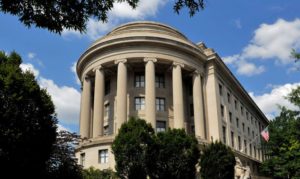
The FTC invokes a rarely used antitrust law, the South Carolina Supreme Court upholds abortion restrictions, and more…
IN THE NEWS
- The Federal Trade Commission (FTC) enforced Section 8 of the Clayton Act for the first time in 40 years, filing a consent order that blocked a $5.2 billion deal between Quantum Energy Partners and EQT Corporation. The proposed deal would have given Quantum a seat on EQT’s board of directors in exchange for two of Quantum’s subsidiaries, a move that the FTC contended would violate Section 8 because the two companies are direct competitors. FTC Chair Lina Khan, who has prioritized antitrust enforcement against large corporations, emphasized that the action is part of a larger effort to “reactivate Section 8” and “put industry actors on notice.”
- The South Carolina Supreme Court upheld a law that restricts most abortions once cardiac activity in utero can be detected, which usually begins around the fifth or sixth week of a pregnancy. In the majority opinion, Justice John Kittredge acknowledged that the law “infringes on a woman’s right of privacy and bodily autonomy,” but countered that the state legislature had reasonably determined that “the interest of the unborn child to live” outweighs those rights. In dissent, Chief Justice Donald W. Beatty argued that the law shared the same deficiencies as a previously struck down 2021 law, such as unclear definitions for the “scientifically inaccurate” terms “fetal heartbeat” and “conception.” As a result of the 4-1 ruling, the ban took effect immediately.
- A federal judge ruled that artwork generated by artificial intelligence cannot be copyrighted. Judge Beryl A. Howell ruled against Stephen Thaler, who sued the U.S. Copyright Office for its refusal to issue a copyright to Thaler for art generated by an artificial intelligence algorithm he created. In her decision, Howell argued that “human authorship is a bedrock requirement of copyright,” as no courts have recognized a copyright for works created without human input. Howell found that the art generated by Thaler’s algorithm was devoid of “any guiding human hand.” Howell also predicted that artificial intelligence tools will continue to present difficult questions about the amount of human involvement needed to copyright certain works.
- The U.S. Securities and Exchange Commission (SEC) voted to reform transparency rules for private equity and hedge funds, which together manage about $20 trillion in assets. When the rules take effect in 60 days, the SEC will require private funds to release quarterly performance reports, disclose fee structures, and perform annual financial audits. The rules are aimed at increasing transparency, fairness, and accountability in the private funds industry. SEC Chair Gary Gensler acknowledged that the Commission had retreated from other proposed reforms after receiving industry comments, but he argued that the proposed changes will benefit investors and promote competition.
- A federal judge temporarily blocked a Georgia election law that banned the provision of food and water to individuals in polling lines. Judge J.P. Boulee also suspended the requirement that voters include their birthdates on the outer envelopes of their absentee ballots, finding no evidence that the requirement protects election integrity. Rahul Garabadu, a senior voting rights staff attorney at the ACLU of Georgia, praised the decision as an “important victory for every eligible voter in Georgia.” Georgia Secretary of State Brad Raffensperger noted that the decision may have a limited impact due to state efforts to ensure short voting lines.
- The National Highway Traffic Safety Administration (NHTSA) proposed a rule to increase seat belt use in motor vehicles. The proposed rule would require the addition of a rear seat belt warning system and an extended seat belt warning for front seat passengers in most passenger vehicles, changes that NHTSA argues could prevent nearly 300 injuries and over 100 deaths annually. Ann Carlson, Acting NHTSA Administrator, believes that the proposed rule would reduce the amount of fatalities in car crashes because seat belt use remains “one of the most effective ways to prevent injury and death in a crash.”
- The Bureau of Safety and Environmental Enforcement issued a final rule implementing new safety regulations for off-shore drilling sites. The new regulation would require swifter investigations in the event of equipment failure, real-time drilling monitoring, and enhanced safety requirements for explosion prevention equipment. The rule reinstates several safety regulations developed after the 2010 Deepwater Horizon disaster that were later relaxed in a 2019 rule. Secretary of the Interior Deb Haaland suggested that the new rule is “necessary to ensure offshore operations” are safe and that the new rule’s requirements are “based on the best available, sound science.” The American Petroleum Institute countered that the rules “restrict American energy, which could lead to higher energy costs and weaken U.S. security.”
- The Federal Communications Commission proposed a new rule to alter how FM radio stations modify their broadcast signals. Existing procedures require FM broadcasters to request experimental permission before expanding and strengthening their broadcast signals. The proposed rule would permit more FM stations to increase their signal broadcasting power and would allow FM radio stations to increase their overall broadcast frequencies to improve digital coverage while protecting adjacent FM signals.
WHAT WE’RE READING THIS WEEK
- In a working paper released by the National Bureau of Economic Research, Jessica Parys, a professor at Hunter College, and Zach Brown, a professor at the University of Michigan, measured the impact of increased broadband access on health outcomes for common Medicare procedures. Using Medicare claims and zip code data on internet rollout, Parys and Brown found that readmission rates within 30 days of a surgery improved by 5.7 percent in areas with multiple broadband providers, although mortality rates were unchanged. Parys and Brown explained that much of that relationship is due to “a shift in patient demand to higher quality providers,” which will improve access to more competitive health care offerings. Parys and Brown concluded that policies to increase broadband coverage should account for positive spillover effects on health.
- In a policy analysis issued by the Cato Institute, Vanessa Brown Calder, Director of Opportunity and Family Policy Studies at Cato, and Chelsea Follett, Policy Analyst and Managing Editor of HumanProgress, assessed the effectiveness of policies intended to bolster declining fertility rates. Brown Calder and Follett suggested that policies should aim to make family life easier for parents of young children, rather than attempting to use government subsidies to promote fertility. Brown Calder and Follet proposed promoting flexible work schedules by updating the Fair Labor Standards Act and suggested the adoption of flexible local labor regulations to give parents more autonomy. Brown Calder and Follett concluded that more flexible governmental intervention is key to crafting pro-family policy, as it allows parents to make choices for the betterment of their children.
- In a recent article in The Hill, Cary Coglianese, a professor at the University of Pennsylvania Carey Law School, analyzed the potential impact of the U.S. Court of Appeals for the Federal Circuit’s decision in Royal Brush Manufacturing v. United States on individual due process rights in the era of artificial intelligence. In Royal Brush Manufacturing, the Federal Circuit held that an importer’s lawsuit seeking the photos and data that U.S. Customs and Border Protection had used to determine that an importer had violated trade rules took priority over the trade secrets claimed by the third-party company from which the photos and data had been taken. Coglianese argued that the Federal Circuit’s reasoning could influence future courts to find that individuals have a due process right to the data and algorithms relied upon by third-party algorithms when individuals challenge the government’s application of machine-learning algorithms.
EDITOR’S CHOICE
- In an essay in The Regulatory Review, Stuart Shapiro, Dean of the Edward J. Bloustein School of Planning and Public Policy at Rutgers University, and Deanna Moran, Vice President for Healthy and Resilient Communities at the Conservation Law Foundation, analyzed the economic impact of voter identification requirements. Shapiro and Moran determined that the economic costs of voter identification requirements include the time required to gather the necessary documentation, seek transportation to the nearest motor vehicle registration office, and then wait at that office. Using North Carolina’s 2013 voter identification law as a model, Shapiro and Moran argued that if adopted nationwide, voter identification laws could cost around $500 million.



